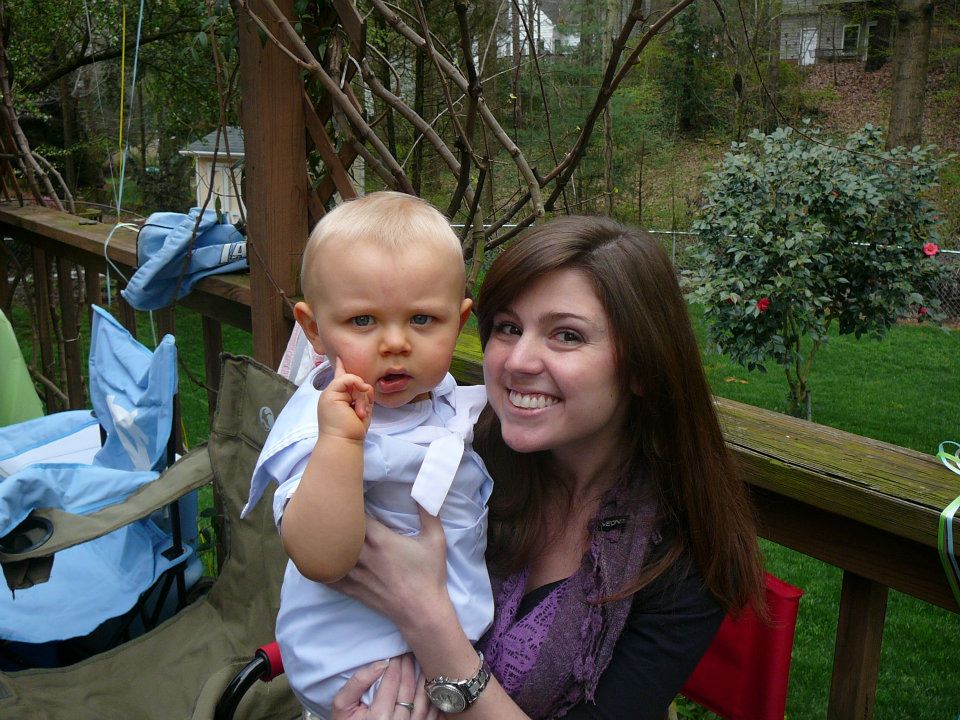It’s amazing to think how far we can come in just a few short years. On this day, just two years ago, I was sitting in a hospital bed on Easter Sunday. I was on day four of my second trip to the hospital within a week and probably my sixth hospitalization in as many months. I was worn down. I felt defeated. I wanted to fight, but I didn’t have much left. But more than anything, I was scared. I was scared of what it would mean to live my life without a colon, scared to go on with a bag stuck to my stomach.
 I wrote this post on that day in the hospital. It was for a fundraiser my friend was hosting on her blog that raised money for Crohn’s disease and ulcerative colitis research. The picture I included was taken about two weeks before that hospital stay at my nephew-in-law’s first birthday. (I didn’t allow many pictures to be taken, so this is the only one I could find from around that time.) You may not know it from the picture, but I was able to hold him long enough to take that picture and had to quickly hand him over because my stomach could not take the stress. I also spent the rest of the party propped up on the couch because my knees and back were aching with arthritis so badly that I could hardly move.
I wrote this post on that day in the hospital. It was for a fundraiser my friend was hosting on her blog that raised money for Crohn’s disease and ulcerative colitis research. The picture I included was taken about two weeks before that hospital stay at my nephew-in-law’s first birthday. (I didn’t allow many pictures to be taken, so this is the only one I could find from around that time.) You may not know it from the picture, but I was able to hold him long enough to take that picture and had to quickly hand him over because my stomach could not take the stress. I also spent the rest of the party propped up on the couch because my knees and back were aching with arthritis so badly that I could hardly move.
It is, as I said, amazing to look back and remember those feelings that day. I will always remember them. But even more, I will always remember rising above them
—————
April 8, 2012
I am writing this from a hospital bed. It’s not where I imagined I’d be spending my Easter weekend, but I had a bad bout of symptoms kick up this past week and I ended up here. Now, I have to debate the possibility of losing my colon.
I was diagnosed with Crohn’s disease in 1999, when I was thirteen years old. For a couple of years preceding the diagnosis I dealt with symptoms including stomach pain, diarrhea and weight loss. In 8th grade, my symptoms hit an apex. I was a tiny 75 pounds, and quickly dropped to down 50. I stopped going to school. I was constantly running to the bathroom. I was even blacking out at times, once almost falling down the stairs. I was admitted to the hospital and hooked up to all kinds of fluids and nutrients. After twenty-five difficult days of medicine and prayer, I was able to go home. It was a rough road to gaining weight and strength, not to mention trying to fit back in at school after missing half a semester.
I got back on my feet and spent five years with no symptoms, other than an occasional “flare up” that would last a couple of days. It wasn’t until my freshman year of college that I had another big Crohn’s related issue and landed in the hospital for the two weeks before Christmas. After that I spent several years teetering between flares. I’d have periods of symptoms and periods of normality. Then about the time I graduated, four years ago, things seemed to level off and my symptoms decided to stick with me constantly. Since then, I’m not sure that there has been one day I have not dealt with symptoms.
Crohn’s is an invisible disease. You don’t pass somebody on the street and know that they’re dealing with it. If you saw me at the mall, you’d never guess I had an issue. That’s because it attacks the gut, and those of us with Crohn’s have had lots of practice hiding it. Many people don’t realize the severity of the disease because its sufferers don’t often “look sick.” Crohn’s disease involves inflammation of the digestive tract, or “redness, swelling, pain, tenderness, heat, and disturbed function of an area of the body, especially as a reaction of tissues to injurious agents” (dictionary.com), i.e. when a sprained ankle swells up. But this inflammation is irritated by the food moving through the digestive tract leading to the pain, and the food is pushed through without nutrients being absorbed. Ultimately, there is diarrhea and often a loss of blood.
There are a number of medications out there, but many have severe long-term effects and some are so new that the long-term effects aren’t even known. Most Crohn’s medications were developed for other issues such as arthritis, psoriasis and even MS, which have similarities to Crohn’s. No major medication has been specifically developed with Crohn’s sufferers in mind.
For me, I’ve run the gamut. I have tried about every medication possible, and have even done some alternative treatments such as diet and acupuncture. Nothing has seemed to work. So here I am, doing all I can to hold on to my colon and not lose a vital organ from my body. In my scenario, losing my colon means an ostomy bag.
Research for Crohn’s and other inflammatory Bowel Disease has come a long way in recent years. New medications are on the horizon and I continue to hope that a cure is within reach. I can’t say “thank you” enough to Reagan and Glory Tree Flowers for wanting to take part in something so needed and so close to me. I can only hope and pray that in the near future; someone else won’t have to be laying here wondering if they’ll be able to keep their colon.


2 Comments
So, here I am (again), not having any type of intestinal/digestive issue yet relating to and being moved by your blog posts. It’s funny because I am wearing my “PTSD. Not All Wounds Are Visible” shirt today. I have said it before; your strength and perseverance is refreshing. Keep it up, chica!
April 10, 2014 at 8:20 am“It’s amazing to think how far we can come in just a few short years” SO true!! I reflected on the same thing today in a blog post. A few years can make all the difference in your heart, mind, body, and outlook. While it’s still beneficial yet painful to remember back on difficult times, how inspiring it also is to see your comeback today!
April 10, 2014 at 2:30 pmThank you for sharing! SO honored to read your post form 2 years ago.